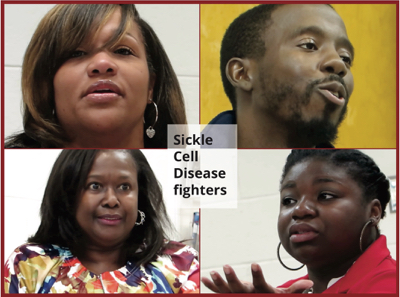
April 21, 2015
Four health care advocates made the case at the Forum today for greater awareness of sickle cell disease, a genetically transmitted disease that causes potentially life-threatening complications among its predominantly African-American victims.
About 800 adults and children in Mecklenburg have the disease, said Azizi Coleman, program manager for the Charlotte office of Piedmont Health Services and Sickle Cell Agency.
Thousands more are carriers of the sickle cell trait. When two people with the trait have a child, there’s about a one-in-four chance of the child having the disease from birth.
Case Manager Donald Estell, a graduate of Johnson C. Smith University, is one of the victims of this disease. His testimony about knowing he had the disease, but being unable to get a diagnosis for complications during an episode in recent years, was riveting evidence of the difficulties patients face.
Unlike some groups that come before the Forum that appear to attack community problems from within their own little silo, this group focused on coordination of services and collaborating on care and public awareness. Coleman asked one such collaborator to leave the audience for the front table: Shirley Miller is program manager for Dr. Ify Osunkwo’s Adult Sickle Cell Clinic at Carolinas Medical Center, a doctor whose arrival in Charlotte Coleman credited with greatly improving care for adult patients.
Below are videos from the presentation and the Q&A that followed.
As part of the presentation, Coleman offered Forum participants three handouts: a brochure, a flyer and a list of public public forums on the disease.
Coleman gave her telephone contact number as 704-910-2002. The Charlotte office of Greensboro-based Piedmont Health Services and Sickle Cell Agency has a web page here.
Presentation
Q&A
Q: In the ‘60s we knew about sickle cell. What happened? Do you do marathons or runs, like the cancer society?
Q: For old people like me, what can we do in addition to giving money?
Q: My friend has lost her home and is on dialysis daily. I don’t want my boys to marry a woman with the sickle cell trait. What can I do?
Q: Does sickle cell get identified in the course of regular medical exams?
Q: When you had difficulty getting proper diagnosis, you didn’t know you had sickle cell?
Q: How do you plan to develop a relationship with C.W. Williams Community Health Center?
Q: Is there a cure for sickle cell disease?
Q: Is there any promise research elsewhere in the world, or is the U.S. far ahead?
Q: Are you talking about sickle cell anemia? That’s the name I know it by.
Q: Sickle cell originated in Africa as protection against malaria? Did I answer my own question?
Q: Is there a way to separate discussion of this disease from the race of the victims? There must be other race-specific diseases.
Q: Interracial sexual activity leaves many with sickle cell trait. Can we talk about this as something other than a Negro disease?
Q: Do biracial relationships reduce the incidence of sickle cell disease?
Q: Is your group lobbying for additional federal investment in research on sickle cell?
Q: There are claims made for hydrogen peroxide as a cure. Do you know about that?
Q: Do educators know how this disease can be affecting their students?
Q: Do patients get blood transfusions?
Q: Would it be good to have a prominent local person to be your spokesperson for this treatment effort?
Q: What can we do to push for adequate funding for your educational mission?
Q: Have there been studies on the number of people affected?
Q: Can I give you names later of teachers you should talk to?
Q: With the advances in DNA work, would you expect treatments through gene therapy?
Q: Does this disease hit the poor disproportionately? How many of those 30 babies are in struggling families?
Q: What kind of support are you getting from religious institutions?
Q: Could you work with state education leaders to include sickle cell in the N.C. health curriculum at various grades?
Q: Since the ebola crisis, people have come here from West Africa. Is someone reaching out to their pastors to tell them the services available?
Q: Can we lobby our many governments to put the resources behind treatment so this disease is stopped?